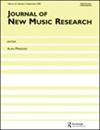基于离散傅立叶变换的颤音分析方法
IF 0.9
4区 计算机科学
Q4 COMPUTER SCIENCE, INTERDISCIPLINARY APPLICATIONS
引用次数: 1
摘要
振动是最常见的音乐技巧之一,用于丰富声乐和乐器的声音。我们提出了一种基于基频轨迹的离散傅立叶变换的方法,可以分析作为时间函数的颤音的语调、振率和振度。根据实验结果,该方法对基频轨迹的不规则性具有鲁棒性。此外,当基频轨迹不是完全正弦时,所提出的方法在语调和颤音范围方面提供了与普拉姆方法不同的结果。本文章由计算机程序翻译,如有差异,请以英文原文为准。
Discrete Fourier transform-based method for analysis of a vibrato tone
Vibrato is one of the most common musical techniques used for the enrichment of vocal and musical instrument sounds. We propose a method that can analyse the intonation, vibrato rate, and vibrato extent of a vibrato tone as a function of time, which is based on the discrete Fourier transform of its fundamental frequency trajectory. According to experimental results, the proposed method is robust to the irregularities in the fundamental frequency trajectory. In addition, the proposed method provides different results for intonation and vibrato extent from those of Prame’s method when the fundamental frequency trajectory is not perfectly sinusoidal.
求助全文
通过发布文献求助,成功后即可免费获取论文全文。
去求助
来源期刊

Journal of New Music Research
工程技术-计算机:跨学科应用
CiteScore
3.20
自引率
0.00%
发文量
5
审稿时长
>12 weeks
期刊介绍:
The Journal of New Music Research (JNMR) publishes material which increases our understanding of music and musical processes by systematic, scientific and technological means. Research published in the journal is innovative, empirically grounded and often, but not exclusively, uses quantitative methods. Articles are both musically relevant and scientifically rigorous, giving full technical details. No bounds are placed on the music or musical behaviours at issue: popular music, music of diverse cultures and the canon of western classical music are all within the Journal’s scope. Articles deal with theory, analysis, composition, performance, uses of music, instruments and other music technologies. The Journal was founded in 1972 with the original title Interface to reflect its interdisciplinary nature, drawing on musicology (including music theory), computer science, psychology, acoustics, philosophy, and other disciplines.
 求助内容:
求助内容: 应助结果提醒方式:
应助结果提醒方式:


